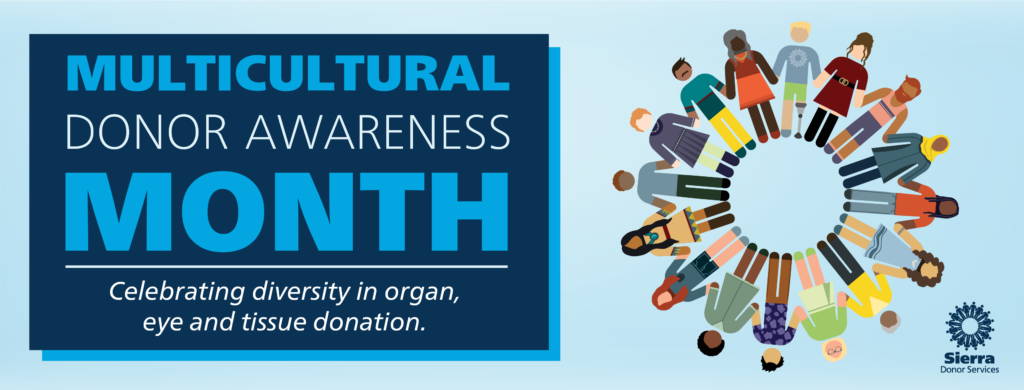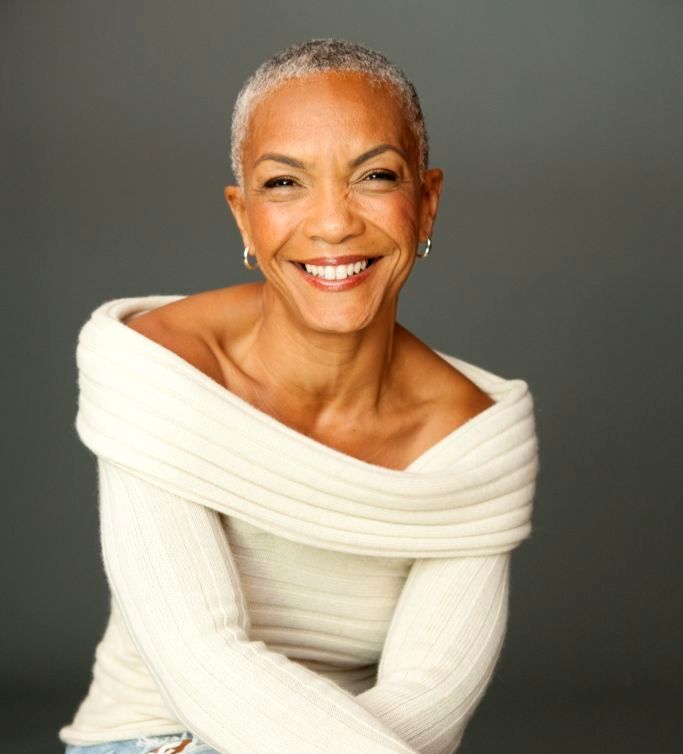News
Guest Blog: Rhonda Smith on National Multicultural Donor Awareness Month
August 25, 2023
Contributed by Rhonda Smith, Executive Director of the California Black Health Network

Background
August is National Minority Donor Awareness Month (NMDAM), which is a collaborative initiative of the National Multicultural Action Group (NMAG) to save and improve the quality of life of diverse communities by creating a positive culture for organ, eye, and tissue donation. This recognition stems from National Minority Donor Awareness Week which was founded in 1996 by the National Minority Organ Tissue Transplant Education Program (MOTTEP). The intent is to bring heightened awareness to the need for donation and transplantation in multicultural communities, with a primary focus on African American, Hispanic, Asian/Pacific Islander and Native American communities.
Increasing awareness among Black, Indigenous, and People of Color (BIPOC) is important because people of color account for about 60% of the donor waitlist in the United States, and 79% in California. Despite the high prevalence of need for organ donation in BIPOC communities, myths about organ donation and mistrust of the healthcare system often prevent our communities from participating in this life saving decision during a critical time when donation is possible.
African Americans make up the largest group of individuals within the BIPOC community who are in need of an organ transplant. In 2021, non-Hispanic Blacks made up 12.1 percent of the national population. The number of organ transplants performed on non-Hispanic Blacks in 2021 was 27.8 percent of the total number of non-Hispanic blacks waiting for a transplant. However, the number of transplants performed on non-Hispanic whites was 47.2 percent of the number of the total number of those individuals waiting. (Office of Minority Health, 2021)
People of color account for 60% of the donor waitlist in the United States, and 79% in California. Despite the high prevalence for organ donation in communities of color, myths about organ donation and mistrust for the medical system often prevent individuals from saying yes during a critical time when donation is possible.
In 2021, disparities by race and ethnicity in the U.S. for those on the organ donation waitlist are detailed below.
Waitlist Disparities
| By Ethnicity | Info | All Organs | Kidney | Liver | Pancreas | Kidney / Pancreas | Heart | Lung | Heart / Lung | Intestine |
| All Ethnicities | # | 20,001 | 17,746 | 1,869 | 75 | 253 | 274 | 93 | 8 | 38 |
| % | 100.00% | 100.00% | 100.00% | 100.00% | 100.00% | 100.00% | 100.00% | 100.00% | 100.00% | |
| White, Non-Hispanic | # | 4,189 | 3,318 | 695 | 25 | 82 | 122 | 46 | 3 | 13 |
| % | 20.90% | 18.70% | 37.20% | 33.30% | 32.40% | 44.50% | 49.50% | 37.50% | 34.20% | |
| Black, Non-Hispanic | # | 1,971 | 1,830 | 89 | 12 | 23 | 38 | 7 | 1 | 6 |
| % | 9.90% | 10.30% | 4.80% | 16.00% | 9.10% | 13.90% | 7.50% | 12.50% | 15.80% | |
| Hispanic/Latino | # | 9,366 | 8,403 | 835 | 29 | 116 | 92 | 34 | 1 | 13 |
| % | 46.80% | 47.40% | 44.70% | 38.70% | 45.80% | 33.60% | 36.60% | 12.50% | 34.20% | |
| Asian, Non-Hispanic | # | 3,894 | 3,651 | 219 | 4 | 23 | 17 | 5 | 2 | 4 |
| % | 19.50% | 20.60% | 11.70% | 5.30% | 9.10% | 6.20% | 5.40% | 25.00% | 10.50% | |
| American Indian/Alaska Native, Non-Hispanic | # | 99 | 81 | 13 | 3 | 2 | 1 | 1 | 1 | 0 |
| % | 0.50% | 0.50% | 0.70% | 4.00% | 0.80% | 0.40% | 1.10% | 12.50% | 0.00% | |
| Pacific Islander, Non-Hispanic | # | 319 | 306 | 8 | 2 | 3 | 2 | 0 | 0 | 1 |
| % | 1.60% | 1.70% | 0.40% | 2.70% | 1.20% | 0.70% | 0.00% | 0.00% | 2.60% | |
| Multiracial, Non-Hispanic | # | 234 | 219 | 10 | 0 | 4 | 2 | 0 | 0 | 1 |
| % | 1.20% | 1.20% | 0.50% | 0.00% | 1.60% | 0.70% | 0.00% | 0.00% | 2.60% |
As indicated above, Blacks, American Indian, Pacific Islander and Multi-racial individuals have the lowest representation on the waitlist compared to Non-Hispanic Whites and Hispanic/Latino individuals.
During NMDAM, it is imperative that national organ donation organizations bring increased awareness to the need for more organ, eye, and tissue donors from multicultural communities, provide donation education, inspire donor registration, and promote healthy living and disease prevention to reduce the need for transplantation. NMDAM can play a key role in addressing disparities in organ donation. It is a critical effort to drive the positive messages needed to help the BIPOC community better understand organ donation, its importance, and how it can save lives. In addition, the messaging will help clarify decision making and overcome barriers for organ, eye, and tissue donation.
Organ donation is part of the equation in closing the gap in health disparities among the BIPOC community, and there are many successful stories of recipients and donors highlighted in Sierra Donor Services August 9 blog.
I call upon national organ donation organizations to bring increased awareness to the need for more BIPOC individuals to consider organ, eye, and tissue donation, and to provide donation education to inspire donor registration and promote healthy living and disease prevention to reduce the need for transplantation. Not just during NMDAM but throughout the year.
And, I urge all of us to consider the gift of life through organ donation.
You can register as an organ, eye, and tissue donor at SierraDonor.org.
About the Author

Rhonda Smith is the Executive Director of the California Black Health Network, a nonprofit that works to advance health equity for Black Californians. Prior to this role, Rhonda was an independent consultant and led many successful health disparities initiatives for the BIPOC community focused on developing and implementing community outreach, health promotion, and health behavior change strategies to close the gap in disparities.
Rhonda has served in various nonprofit leadership roles that include Consultant/Project Director for the LiveHealthy OC Initiative, a three-year initiative that aimed to transform the model of care of a network of FQHCs from a disease-focused treatment model to prevention and wellness model, providing whole person care approach. Before the LiveHealthy OC Initiative, Rhonda served as the Consultant/Statewide Project Manager for the Susan G. Komen® Circle of Promise California Initiative, an intensive four-year effort to identify evidence-based strategies to decrease the high mortality rate of African American women diagnosed with breast cancer, and address disparities at the system, community, and individual levels.
Rhonda earned her MBA in Marketing and Operations Management from the Darden School of Business at the University of Virginia and her B.S. Degree in Civil Engineering from Virginia Tech.
About Sierra Donor Services
Sierra Donor Services (SDS) serves nearly three million people in Northern California and Northern Nevada. We are an exceptional team of professionals dedicated to saving and improving lives by connecting organ and tissue donation to the patients who need them. We strive to extend the reach of each generous donor’s gift to those who are always profoundly grateful for them.